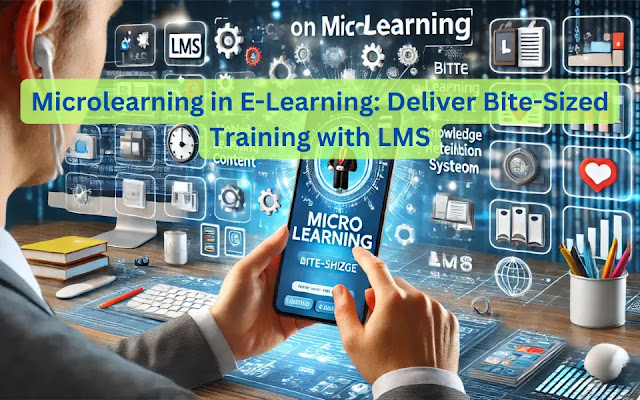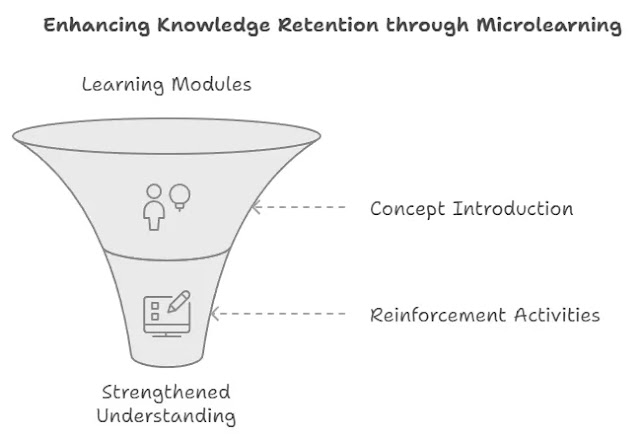The world of e-learning is evolving, and one of the most significant trends shaping this transformation is microlearning. With the rise of digital platforms and the need for more flexible learning environments, microlearning in LMS (Learning Management Systems) has become a key driver in providing efficient, accessible, and engaging training programs. This article dives deep into how microlearning works in an LMS context and how it’s changing the way we learn and teach, particularly in corporate training.
What is Microlearning in LMS?
Microlearning refers to delivering educational content in small, digestible chunks rather than traditional long-form lessons. It focuses on short-term learning activities, often in the form of short videos, quizzes, or infographics, and is designed to fit into busy schedules. When integrated into an LMS, microlearning allows learners to access these bite-sized modules on-demand, making it perfect for mobile learning or just-in-time training.
Why Microlearning is Effective
Microlearning has gained popularity due to its flexibility and efficiency. Its short-form nature helps in:
- Increased Knowledge Retention: Breaking down information into small pieces enhances understanding and retention.
- Just-in-time Training: Learners can access specific information when they need it, making learning more relevant and practical.
- Accessibility: Mobile learning LMS platforms allow learners to complete modules anytime, anywhere, fitting into their daily routines seamlessly.
By leveraging an LMS for microlearning, companies can deliver personalized and adaptive learning experiences that suit individual learner preferences and styles. This approach aligns well with the growing demand for continuous learning environments in the workplace.
Check out the best free microlearning apps that provide quick, accessible lessons to boost your skills on the go.
Key Benefits of Microlearning with an LMS
The combination of microlearning and LMS creates a powerful tool for e-learning solutions. Here are the top advantages:
1. Boosts Engagement with Gamified Learning Systems
Microlearning is inherently more engaging than traditional training methods. Many LMS platforms come equipped with gamification features that turn learning into a game-like experience. This can include:
- Interactive Learning Tools: Quizzes, simulations, and challenges that engage learners.
- Badges and Leaderboards: Rewards and recognition for completing tasks or achieving high scores.
Such interactive and rewarding experiences keep learners motivated and can improve completion rates in corporate training programs.
2. Supports Asynchronous Learning
In today’s fast-paced world, asynchronous learning—where learners complete training at their own pace—has become a must. Microlearning in LMS supports this by offering self-paced modules that can be completed in short bursts. This provides several benefits:
- Flexibility: Employees can engage with content on their schedule, fitting training around their work and personal commitments.
- Immediate Feedback: Many LMSs are equipped with instant grading and feedback tools, allowing learners to immediately see how they performed, which enhances the learning process.
Asynchronous learning through microlearning makes training more convenient and less disruptive to the workday.
3. Improved Knowledge Retention Strategies
Traditional long-form training sessions can overwhelm learners with information. In contrast, microlearning breaks information down into manageable chunks, leading to better retention. When combined with spaced repetition and performance support tools within an LMS, learners are more likely to retain the material long-term. Key aspects include:
- Short-form Learning Modules: Micro-courses that allow learners to absorb one key concept at a time.
- Reinforcement Activities: Quizzes and follow-up tasks that revisit key points to strengthen understanding.
This strategy is especially effective in compliance training, where learners need to recall specific information accurately.
4. Personalization and Adaptive Learning Technology
LMS platforms now come equipped with adaptive learning technology, allowing for personalized learning paths. This means each learner’s experience can be tailored based on their previous interactions, assessments, and learning preferences. Here’s how:
- Customized Learning Paths: LMSs can curate a personalized training journey for each learner, automatically suggesting modules that fit their level or interest.
- Real-time Data and Analytics: Corporate training software can track learner progress, allowing for real-time adjustments to learning paths.
Personalization through adaptive learning not only improves engagement but also enhances learner outcomes, making the training more effective.
5. Seamless Integration with Corporate Training Software
The combination of microlearning LMS and corporate training software enables seamless integration of microlearning into broader training programs. LMS platforms that are SCORM-compliant or Tin Can API-enabled ensure that all training content can be tracked and measured effectively. Corporate training teams can easily:
- Monitor Progress: Track how learners engage with microlearning content.
- Assess Impact: Evaluate the effectiveness of training modules and adjust as necessary to meet learning goals.
This level of integration also supports blended learning systems, where microlearning can complement in-person training or virtual instructor-led sessions.
How to Implement Microlearning in Your LMS
Now that we’ve explored the benefits of microlearning, let’s dive into practical steps to implement it using an LMS.
Design Bite-Sized Learning Modules
When designing a microlearning program, focus on creating short-form learning modules that are concise and focused on a single topic or skill. Here are a few guidelines:
- Keep it Short: Aim for modules that can be completed in 3-5 minutes.
- Use Multimedia: Incorporate videos, infographics, and audio for a richer learning experience.
- Interactive Components: Include quizzes or other interactive elements to keep learners engaged.
Choose the Right LMS Platform
Selecting the right LMS platform is key to a successful microlearning initiative. Look for the following features:
- Mobile Learning Capabilities: Ensure that your LMS supports mobile learning, allowing learners to access content on their smartphones and tablets.
- Gamification and Interactive Tools: Choose an LMS with features that promote engagement, such as gamification elements or learning experience platforms (LXPs).
- SCORM-compliance: If your organization needs to track learning progress, ensure the LMS is SCORM-compliant or compatible with modern tracking standards like xAPI (Tin Can API).
Leverage Adaptive Learning for Personalization
Personalization is a critical element of modern e-learning, and adaptive learning technology enables this within an LMS. Adaptive learning adjusts the difficulty and progression based on a learner’s performance, ensuring a tailored learning journey. Implement this technology to:
- Customize Content: Serve different microlearning modules based on the learner’s performance and knowledge level.
- Boost Engagement: Personalized learning experiences foster deeper engagement and drive better outcomes.
Encourage Continuous Learning
Finally, microlearning supports the concept of continuous learning environments by encouraging employees to regularly engage with training content. An LMS can send notifications and reminders to encourage ongoing participation, reinforcing the idea of learning as an ongoing process, rather than a one-time event.
Conclusion
Microlearning within an LMS has transformed the landscape of e-learning. By delivering bite-sized training in a way that is engaging, flexible, and personalized, businesses can improve their training programs and knowledge retention strategies. Whether you’re integrating it into a corporate training software or using it as part of a blended learning system, microlearning offers a powerful way to boost learner engagement and drive measurable results.
For businesses looking to stay competitive and ensure their workforce remains skilled and knowledgeable, adopting microlearning LMS solutions is a smart investment. Now is the time to deliver training that fits the modern learner's needs.
FAQs
How does microlearning improve knowledge retention?
Microlearning improves knowledge retention by breaking information into manageable, bite-sized chunks that are easier to absorb. Spaced repetition and interactive elements also help reinforce learning.What makes an LMS suitable for microlearning?
A suitable LMS for microlearning should support mobile learning, offer interactive and gamified elements, and be SCORM-compliant to track learner progress effectively.Can microlearning be used for corporate training?
Yes, microlearning is ideal for corporate training. It offers flexibility and accessibility, making it easier for employees to fit training into their busy schedules.What are some examples of microlearning content?
Examples of microlearning content include short videos, quizzes, infographics, flashcards, and quick tutorials focusing on a single topic.Is microlearning suitable for all types of learners?
Microlearning is particularly effective for learners who prefer flexible, self-paced training. However, it may not suit every learning style, especially those who prefer in-depth or hands-on instruction.How does adaptive learning technology enhance microlearning?
Adaptive learning technology personalizes the learning experience by adjusting content and progression based on a learner's performance, ensuring that training is tailored to individual needs and learning speeds.








